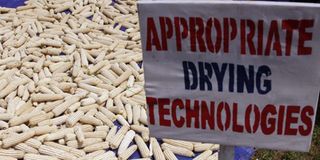New laboratory to boost the war against aflatoxin

Aflatoxin infestation has made it difficult for maize from Meru County to access the milling market.
Meru County has moved closer to stemming aflatoxin infestation that has made it difficult for maize from the region to access the milling market.
The county is setting up an aflatoxin testing lab and research centre in partnership with the University of Nairobi and a US-based university.
Meru is among the aflatoxin contamination hotspots in the country, which also include Machakos, Makueni, Kitui, Tharaka-Nithi, Tana River, Taita-Taveta, Kwale, Kajiado and Kilifi.
According to Meru County director of public health John Inanga, the lab will have capacity to test aflatoxin levels in flour and grains from traders, millers and institutions. “We have already set up the lab and have received equipment and reagents to kick off testing. We are in the process of procuring a milling machine for the lab. This will ease testing of samples from the county,” Dr Inanga said.
He said once in place, agriculture officials will be able to advise farmers on how to prevent and eradicate aflatoxin contamination in the soil and grains.
Cut costs
A 2016 study by the health department and the Food and Agriculture Organisation (FAO) established that the average aflatoxin levels in Meru grains stand at 46.6 ppb above the safe limit of 10 ppb.
Meru food safety director Ephantus Kariuki said the study showed that Igembe South, which is largely a consumer of maize, had the highest aflatoxin contamination at 26.7 per cent.
The study established that ground nuts, which are mostly grown in North Imenti, had the highest concentration of aflatoxin.
Dr Kariuki said the lab will enhance testing and advise on interventions in the county as it cuts on costs of sending samples to Nairobi. “Our main target will be institutions such as schools, hospitals, cereal traders as well as large scale and small scale millers,” Dr Kariuki said.
He said the county had already developed an aflatoxin management policy and was in the process of coming up with a food safety policy.
“The food safety policy will address other poisonous substances being used in farming including handling of chemical residue. This will ensure our food is safe from farm to consumer,” he said.
The Meru County aflatoxin risk management policy requires grain farmers, traders and transporters to adhere to strict guidelines to prevent consumption of aflatoxin infested products.
The policy is aimed at increasing awareness on aflatoxin risks, reducing contamination in food and animal feed, support research and technology in control and prevention as well as enhancing food safety monitoring.





